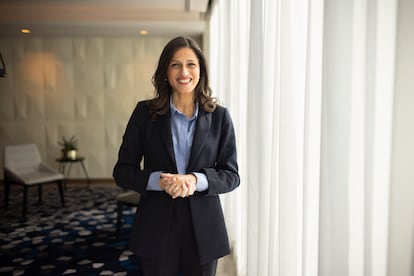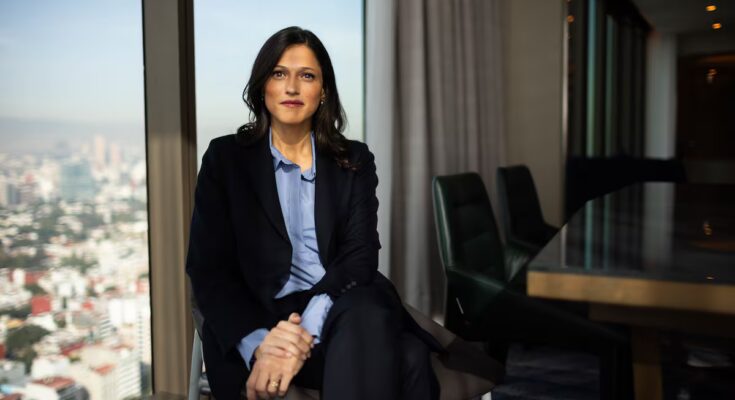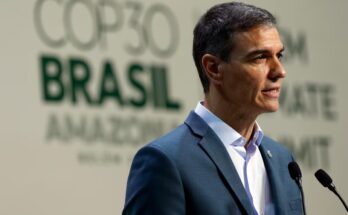Mexico and France will celebrate 200 years of diplomatic relations in 2026. The bond between the two countries has not always been so friendly. Mexico was the victim of French interventions throughout the 19th century, the last in 1862 under the pretext of non-payment of Mexico’s foreign debt. Napoleon III, with the aim of expanding his influence in America, imposed what was called the Second Mexican Empire, with the enthronement of Maximilian of Habsburg, later captured and executed, in 1867.
It is a wound that still persists, although both countries have tried to keep their relations within a framework of cordiality. But now the French government, under the impetus of a weakened President Emmanuel Macron and in the off hours, looks across the Atlantic and seeks to “relaunch” those relations in the midst of a new global geopolitical landscape marked by the return of Donald Trump to the presidency of the United States, with a turn towards nationalism, the weakening of multilateralism and a policy of blackmail with its economic partners.
Macron made a lightning visit to Mexico on Friday to meet President Claudia Sheinbaum, the first time in eleven years that a French leader has visited the North American nation. Eleonore Caroit, minister responsible for Francophonie, international associations and French people abroad, was part of the delegation accompanying Macron and in this interview she takes stock of a meeting marked by the breakdown of multilateralism, the fight against drug trafficking and a strong request from Sheinbaum: the restitution of the pre-Hispanic codes that Mexico claims from France. Caroit (Paris, 40 years old), of Dominican origins, received this newspaper in the presidential suite that Macron occupied for a night at the Sofitel hotel in Mexico City to talk about what he defines as a new chapter in relations between the two countries.
Ask. What message does France want to send with this visit at a time of geopolitical changes and international tensions?
Answer. This context is very important. I think sometimes we take for granted the fact that we have good relations, we share values, very strong historical ties, but this needs to be said more loudly. These types of visits are important in a context in which there are countries that are moving away from multilateralism or that are strongly questioning things that are important to us, such as the fight against climate change, the protection of minorities and women’s rights. Mexico is a leading country in Latin America, it is one of the most developed countries, with a great civilization, a very rich history and is also very dynamic. It is a bridge between Latin America and the United States, which is very strategic. This was one of the messages sent: to strengthen our relations with Mexico, which are already very good, but also to give it a much more political dimension and to be able to continue working so that there is more French presence in Mexico.
Q. What do you mean when you talk about a more political dimension?
R. When there are important countries like Mexico or France in Latin America and Europe, it is important to underline the importance of multilateralism and that the institutions of the United Nations continue to be preserved, financed, developed and their value recognized. Obviously they are not perfect, but they are necessary and are places of dialogue between different nations, where global issues are addressed. We were just before at COP 30 in Brazil. For President Macron it is very important to continue to be present at these COP 30 and show a form of leadership.
Q. Have you reached an agreement on the climate issue with Mexico?
R. We are working with Mexico on an agenda of sustainable development and adaptation to climate change and French companies have great know-how there too. This was part of the more general dialogue. We share values, we believe in multilateralism and we need to get closer.
Q. Specifically, what were the agreements reached on this visit?
R. The first thing was the renewal of the so-called Strategic Committee between France and Mexico, which had been created several years ago and which needed an impetus to restore its dynamism with businessmen, actors from different sectors who will strengthen the France-Mexico relationship. Mexico needs investment in infrastructure and France has the know-how in the infrastructure sector. France attracts foreign capital. Mexico right now is investing in several places around the world. It’s knowing in which sectors there are needs and where we can respond with know-how that will differentiate us from other countries in the world. We are major economies and I believe that the volume of trade between France and Mexico could be much greater than it is today.
Q. He was referring to countries that are moving away from multilateralism. What differences do you observe between France’s relationship with Latin America and that maintained by powers such as the United States, in constant tension since the return of President Donald Trump?
R. It is clear that President Donald Trump has stated that he does not have much confidence in multilateral bodies. The fact that, for example, USAID has been dismantled, that we have a very different vision regarding the climate, are points on which we are not aligned. Now we continue to be an ally of the United States in many very important things, such as our position on different conflicts, the need to find a lasting solution. But regarding multilateralism, international bodies, development, the United States has evidently taken a step back and in this sense it is important to highlight that a country like Mexico continues to believe it is much more present in international bodies.
Q. Is this visit by President Macron a way to revive relations between Mexico and France?
R. This was absolutely the goal of the visit. The relationship exists, it is embodied in many ways. We talked a lot about economics, because obviously this is a very important aspect, but there is also scientific cooperation, cultural cooperation, etc. It’s not that there wasn’t a relationship, but we had to give it an even more political dimension and above all because next year we will celebrate 200 years of our relationship. We are preparing many events and meetings on the bicentennial and this visit is also in preparation for this year of Franco-Mexican celebrations.
Q. In the press conference with the president, Macron referred to the issue of drug trafficking. How does France perceive the work carried out in Mexico against organized crime?
R. France wants to work with its allies in the region, especially Mexico, to fight drug trafficking. We have judges throughout Latin America who we call liaison magistrates who also allow us to maintain links with the different investigative systems of the countries to prevent the development of these drug trafficking networks, but we can achieve even stronger cooperation at the level of coordination of our armed forces.
Q. I ask because there is strong criticism of the way the United States is developing actions against drug trafficking in the Caribbean. You have Caribbean roots, what do you think of this strategy?
R. France had the opportunity to speak officially, particularly at United Nations bodies. I believe the position is very clear: we have total respect for international law, which is our compass. We believe that it is essential to be able to provide the necessary means to effectively combat what is now multinational organized crime. Keeping these two dimensions clear, I believe that the priority for us is to ally ourselves with countries that have a real interest in fighting drug trafficking to achieve effective results, because drug trafficking generates a lot of violence and a lot of tragedy both in the countries from which the drugs come and in the countries that receive them.

Q. Macron has promised to organize an exhibition in Mexico in 2026 in which the Codex of Azcatitlán will be exhibited. Does this predict your return to Mexico?
R. France has a very clear return policy, with a very innovative legal framework that must meet a series of criteria. There have been discussions on this topic, because there are some requested objects that do not meet these criteria, but I believe that everything has been done in a very open, transparent way and, above all, with great cooperation between the Mexican and French ministries of Culture. They are working to define the framework of the transversal exhibitions that will be held, because the issue is that there is a crossover of objects that are sent to Mexico and France. The exact terms of this issue are still under discussion, but what I can tell you at this level and from my position, because it is obviously another issue for the Ministries of Culture, is that the discussions have been pleasant, calm, because there is a real willingness to work together.
Q. Has the question of return been discussed?
R. Not that I know of, but I wasn’t directly involved in all the discussions and negotiations. What I can say is that yesterday a memorandum of understanding was signed between the ministries of culture. It is on this theme that temporary shipments of objects to France and Mexico are being contemplated as part of these exhibitions.



